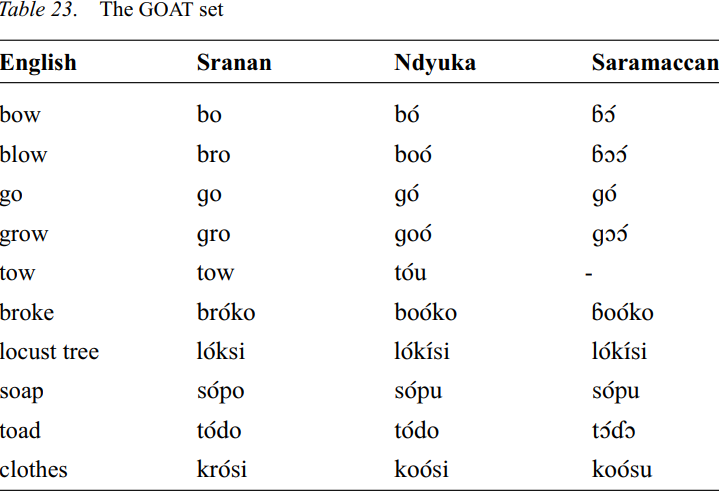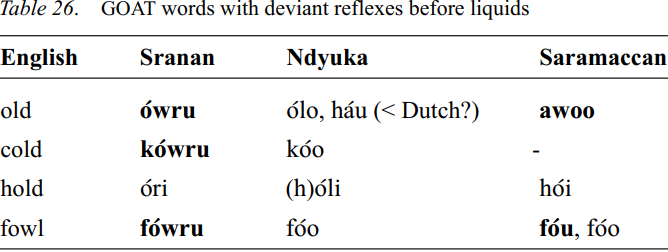


 Grammar
Grammar
 Tenses
Tenses
 Present
Present
 Past
Past
 Future
Future
 Parts Of Speech
Parts Of Speech
 Nouns
Nouns
 Verbs
Verbs
 Adverbs
Adverbs
 Adjectives
Adjectives
 Pronouns
Pronouns
 Pre Position
Pre Position
 Preposition by function
Preposition by function 
 Preposition by construction
Preposition by construction
 Conjunctions
Conjunctions
 Interjections
Interjections
 Grammar Rules
Grammar Rules
 Linguistics
Linguistics
 Semantics
Semantics
 Pragmatics
Pragmatics
 Reading Comprehension
Reading Comprehension|
Read More
Date: 2024-06-22
Date: 2024-04-23
Date: 7-4-2022
|
The GOAT set of words, corresponding to ME /ɔ:/ and /ou/, is represented in Suriname creoles by the English words grow, blow, bow, hold, broke, smoke, soap, clothes, and so on. The normal realization of these words in the Suriname creoles is [o/ç], a short round mid back vowel. When word-final, a diphthongal realization /ow/ is also possible.

Occasionally a vowel /u/ appears in Saramaccan.

Dobson (1957: 674) does mention an occasional raising in ME of /ɔ:/ to /o:/ which would give /u:/ in EModE: “The raising is not characteristic of Standard English but seems to have been common in Northern and Eastern dialects; but it made its way early into London English, in which it was found chiefly in vulgar but occasionally in educated speech.”
Confusingly, in eighteenth century Saramaccan (Schumann 1778) we find smoko but nusso.
Unusually, for over we have a reflex of the stressed vowel in /a/.

This presumably goes back to the form /ɔvər/ recorded by orthoepists (Dobson 1957: 482) in the sixteenth and seventeenth centuries. This would naturally give /a/.
The words old and cold display deviant reflexes in the Suriname creoles, even when compared with words like hold. The reflex is the same as in fowl.

Older recordings such as Van Dyk (ca. 1765) reveal that words like old were originally trisyllabic – ouwere for [o’wuru]. Dobson (1957: 691) infers from the EModE evidence that /ɔ:/ sometimes became /u:/ before /l/, with a subsequent diphthongization to /Λu/ (> /au/), i.e. it joined the MOUTH set. Wells (1982: 312) sees rather an allophonic development before /l/ of London /Λu/ (=EModE /o:/, the GOAT set), to [ɒʊ ~ ɔʊ ~ aɤ] , etc. This has subsequently been involved in a phonemic split. We will not dwell further on this.
|
|
|
|
دراسة يابانية لتقليل مخاطر أمراض المواليد منخفضي الوزن
|
|
|
|
|
|
|
اكتشاف أكبر مرجان في العالم قبالة سواحل جزر سليمان
|
|
|
|
|
|
|
اتحاد كليات الطب الملكية البريطانية يشيد بالمستوى العلمي لطلبة جامعة العميد وبيئتها التعليمية
|
|
|